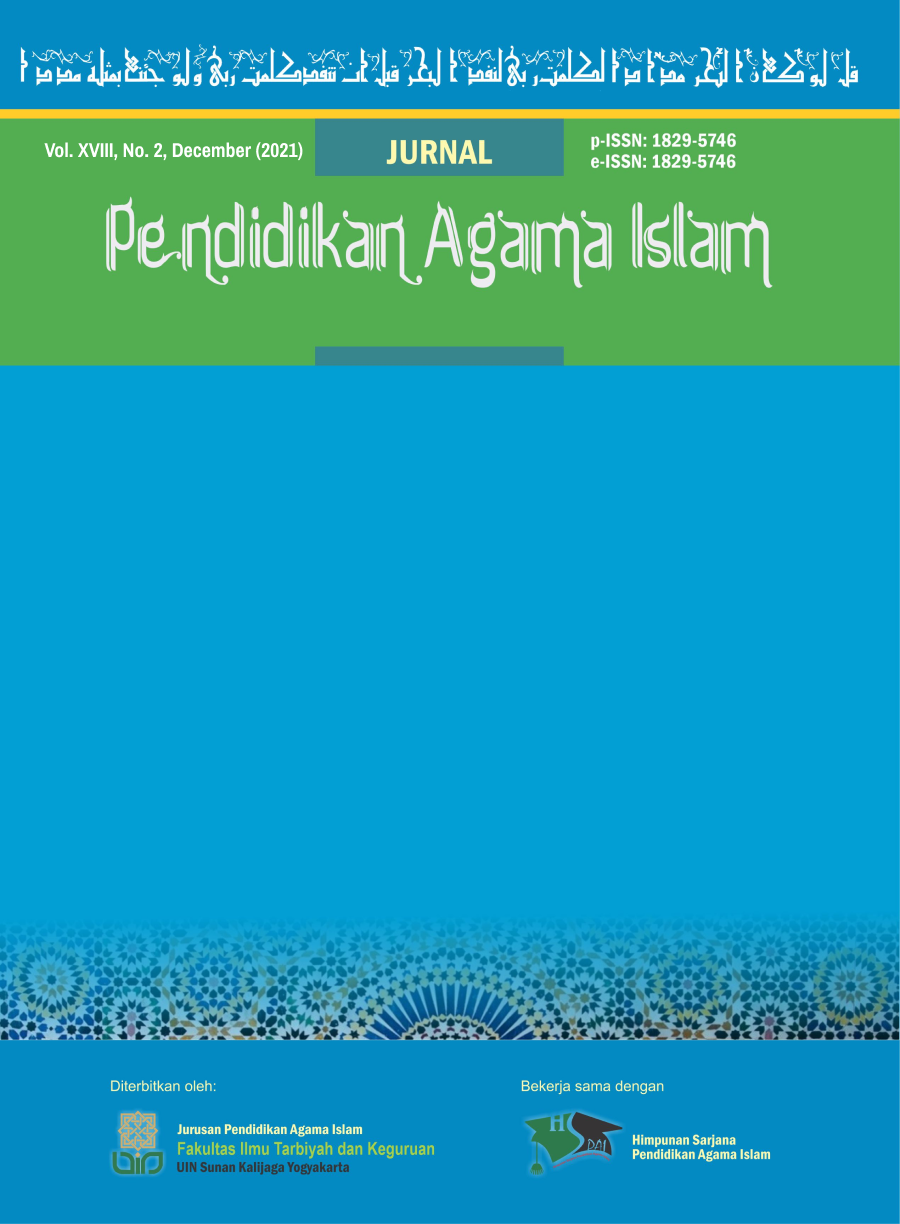Religion Teachers’ Strategies to Internalize Tolerance Values at Catholic and Islamic Schools in Bajawa Nusa Tenggara Timur
##plugins.themes.bootstrap3.article.main##
Abstract
This research discusses the internalization of tolerance values at two educational institutions in Bajawa, East Nusa Tenggara, namely Catholic Elementary School (Sekolah Dasar Katolik) Tanalodu or SDK Tanalodu and Islamic Elementary School (Madrasah Ibtidaiyah) Al-Ghuraba or MI Al-Ghubara. It used a qualitative approach. Data were collected through in-depth interview and observation. This research found the following results: first, the internalization of tolerance values at SDK Tanalodu and MI Al-Ghuraba, including: togetherness, mutual respect, love, help and mutual care. Second, the f teachers’ strategies in teaching religious tolerance, includes exemplary, habituation, appreciation, and warning, telling wisdom stories, and role playing. Third, the impact of internalizing of religious tolerance values at Catholic Elementary School Tanalodu and MI Al-Ghuraba can provide a dynamic space for teachers and students to communicate with each other and respect differences. The implication of this research is the importance of schools providing equal and fair services to teachers and students to practice their respective religions comfortably and freely.
Keywords:
##plugins.themes.bootstrap3.article.details##
Copyright
Copyright Notice
Authors who publish with this journal agree to the following terms:
- Authors retain copyright and grant the journal right of first publication with the work simultaneously licensed under a Creative Commons Attribution License that allows others to share the work with an acknowledgement of the work's authorship and initial publication in this journal.
- Authors are able to enter into separate, additional contractual arrangements for the non-exclusive distribution of the journal's published version of the work (e.g., post it to an institutional repository or publish it in a book), with an acknowledgement of its initial publication in this journal.
- Authors are permitted and encouraged to post their work online (e.g., in institutional repositories or on their website) prior to and during the submission process, as it can lead to productive exchanges, as well as earlier and greater citation of published work.
How to Cite
References
Afandi, A. J. (2019). Best Practice Pembelajaran Toleransi (Implementasi Kajian Tematik Hadith Al-Adyan Bagi Kerukunan Umat Beragama). NUANSA: Jurnal Penelitian Ilmu Sosial Dan Keagamaan Islam, 16(1), 65–76. https://doi.org/10.19105/nuansa.v16i1.2365
Altınoğlu, E. (2018). Religious commitment or a textualist-traditionalist understanding of Islam? The impact of religious orientations upon social tolerance in Turkey. British Journal of Middle Eastern Studies, 45(5), 695–715. https://doi.org/10.1080/13530194.2017.1330135
Aqil, M. (2020). Nilai-nilai humanisme dalam dialog antar agama perspektif Gus Dur. Wahana Akademika: Jurnal Studi Islam Dan Sosial, 6(1), 25–39. https://doi.org/10.21580/wa.v6i1.4915
Balpanov, N., Ismagambetova, Z. N., Karabayeva, A. G., Mirzabekova, A. S., & Rysbekova, S. S. (2018). The Problem of Religious Tolerance in Kazakhstan: Past and Present. Space and Culture, India, 6(2), 17–33. https://doi.org/https://doi.org/10.20896/saci.v6i2.318
Chanifah, N., & Mustapa, A. (2016). Seeking Intersection of Religions: An Alternative Solution to Prevent the Problem of Religious Intolerance in Indonesia. Walisongo: Jurnal Penelitian Sosial Keagamaan, 24(2), 413–422. https://doi.org/10.21580/ws.24.2.1088
Elius, M., Khan, I., Nor, M. R. B. M., Yusoff, M. Y. Z. B. M., & Noordin, K. Bin. (2019). Islam as a Religion of Tolerance and Dialogue: A Critical Appraisal. Journal for the Study of Religions and Ideologies, 18(52), 96–109. http://jsri.ro/ojs/index.php/jsri/article/view/1041
Hamidah, H. (2016). Strategi Membangun Kerukunan Umat Beragama. Wardah, 17(2), 123–136. http://jurnal.radenfatah.ac.id/index.php/warda/article/view/963
Haryanto, J. T. (2013). Kontribusi Ungkapan Tradisional dalam Membangun Kerukunan Beragama. Walisongo: Jurnal Penelitian Sosial Keagamaan, 21(2), 365–392. https://doi.org/10.21580/ws.21.2.250
Ismail, A. (2010). Refleksi Pola Kerukunan Umat Beragama. Analisa: Journal of Social Science and Religion, 17(2), 175–186. https://doi.org/10.18784/analisa.v17i2.36
Ismail, F., Arifin, Z., & Rahmi, S. (2020). Maqasidi Leadership of Minority Religions Figure for Maintaining Tolerance in Manado, Indonesia. Jurnal Pendidikan Islam, 9(2), 149–172. https://doi.org/10.14421/jpi.2020.92.149-172
Kebudayaan, P. P. dan P. B. D. P. dan. (1999). Kamus Besar Bahasa Indonesia. Balai Pustaka.
Kurth, L., & Glasbergen, P. (2017). The influence of populism on tolerance: a thematic content analysis of the Dutch Islam debate. Culture and Religion, 18(3), 212–231. https://doi.org/10.1080/14755610.2017.1358194
Majid, M. F. A. F. (2020). Peran Guru Akidah Akhlak dalam Mengaktualisasikan Sikap Toleransi Pada Peserta Didik (Studi Kelas VIII MTs Pattiro Bajo, Kecamatan Sibulue, Kab. Bone, Sulawesi Selatan). Jurnal Pendidikan Agama Islam. http://ejournal.uin-suka.ac.id/tarbiyah/jpai/article/view/2839
Miles, M. B., & Huberman, A. M. (1984). Qualitative Data Analysis A Sourcesbook of New Methods. Sage Publications.
Muhtador, M. (2017). Teologi Persuasif Ayat-Ayat Makkiyah; Sebuah Tafsir Relasi Umat Beragama. FIKRAH, 4(2), 187–199. https://doi.org/10.21043/fikrah.v4i2.1513
Nuryatno, M. A. (2004). Mazhab Pendidikan Krisis Menyingkap Relasi Pengetahuan, Politik, dan Kekuasaan. Grafindo.
Perdana, S. Q. (2018). Interaksi Sosial Keagamaan Antara Siswa Muslim Dan Siswa Katolik (Studi Kasus SD Slamet Riyadi Kebon Kangkung, Kota Bandung). Religious: Jurnal Studi Agama-Agama Dan Lintas Budaya, 2(2), 149–161. https://doi.org/10.15575/rjsalb.v2i2.3104
Rizqiany, U. (2017). Religious tolerance value analysis perspective teachers of Islam, Christian and Catholic religious education in SMK Demak. ATTARBIYAH: Journal of Islamic Culture and Education, 2(2), 236–255. https://doi.org/10.18326/attarbiyah.v2i2.236-255
Rosyid, M. (2013). Harmoni Kehidupan Sosial Beda Agama dan Aliran di Kudus. ADDIN, 7(1), 41–64.
Rosyid, M. (2017). Local Wisdom Modal Toleransi: Studi Kasus di Kudus. FIKRAH, 4(2), 276–292. https://doi.org/10.21043/fikrah.v4i2.1633
Saputro, F. E. (2020). The Role of Islamic Religious Education Teachers in Actualizing Tolerance Attitudes to Students. Al-Ishlah: Jurnal Pendidikan, 12(2), 336–347. https://doi.org/https://doi.org/10.35445/alishlah.v12i2.214
Siregar, C. (2016). Pluralism and Religious Tolerance in Indonesia: An Ethical-Theological Review Based on Christian Faith Perspectives. Humaniora, 7(3), 349–358. https://doi.org/10.21512/humaniora.v7i3.3589
Sugiyono. (2010). Metode Penelitian Pendidikan Pendekatan Kuantitatif, Kualitatif, dan R&D. Alfabeta.
Suriadi, S. (2018). Internalization of Tasawuf Values in Learning Fiqh at Madrasah Aliyah Sambas Kalimantan. Jurnal Pendidikan Islam, 4(2), 77–92. https://doi.org/10.15575/jpi.v4i2.2014
Ulwan, A. N. (2007). Pendidikan Anak dalam Agama. Pustaka Amani.
Widyaningsih, T. S., Zamroni, Z., & Zuchdi, D. (2014). Internalisasi dan Aktualisasi Nilai-Nilai Karakter pada Siswa SMP dalam Perspektif Fenomenologis. Jurnal Pembangunan Pendidikan: Fondasi Dan Aplikasi, 2(2). https://doi.org/10.21831/jppfa.v2i2.2658
807
Views
543
Downloads

